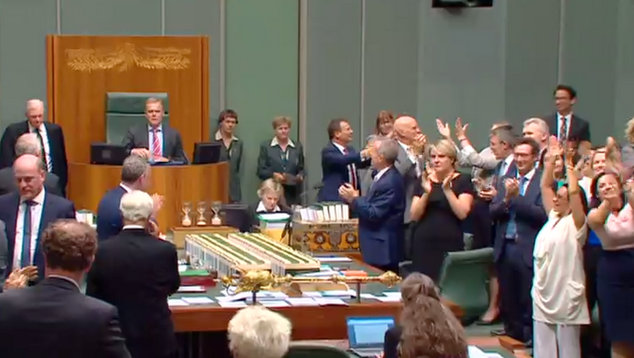Marriage Equality became law in Australia
Today marks seven years since a Bill to legislate for marriage equality in Australia passed through the House of Representatives.
Following the ‘Yes’ result of 61% in the Australian Marriage Law Postal Survey, the Bill from Liberal Senator Dean Smith with co-sponsorship from Labor, The Greens, Nick Xenophon Team and Derryn Hinch was the topic of fierce debate in both houses for two weeks.
Amendments put forward by Former Prime Minister Tony Abbott, then-Treasurer Scott Morrison, Coalition MPs Michael Sukkar, Andrew Hastie, Alex Hawke, Andrew Broad, Sarah Henderson and The Greens’ Adam Bandt all met a major bloc of opposition, being knocked down either by a large majority or ‘on the voices’ of the house without division.

The passage of the Bill saw Australians in same-gender relationships begin to marry from January 2018.
The Smith Bill in its un-amended form allowed marriage celebrants able to ordain marriage between any two consenting adults, and provided exemptions for religious ministers, and celebrants who register as ‘religious’, to refuse service based on objections of faith.
Just four House MPs voted against the passage of the Bill; Government MPs David Littleproud, Russell Broadbent and Keith Pitt, and Queensland MP Bob Katter. Littleproud and Katter’s seats had voted No in the postal survey, but Broadbent’s Victorian seat had voted Yes, and so had Keith Pitt’s seat of Hinkler.
Ten MPs chose to abstain from the vote, including WA MP Andrew Hastie, former Deputy PM Barnaby Joyce, former Prime Minister and one of the plebiscite’s architects, Tony Abbott, and future PM Scott Morrison.
As soon as the decision was announced the public gallery burst into a long round of applause that went for several minutes, politicians hugged, and the House burst into song with a hearty rendition of I Am Australian.
OIP Staff, this post was originally published in 2020, and was later updated.





